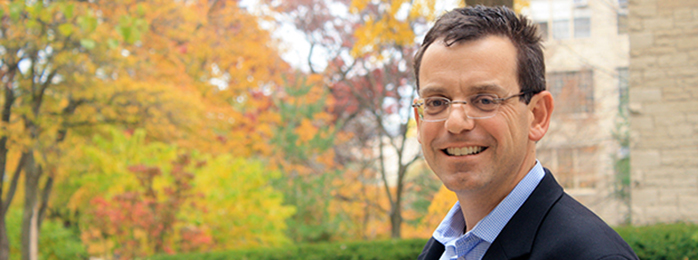
Professor Named "Emerging Leader"
The Chicago Council on Global Affairs identifies Brian Edwards among those whose work will make an impact
Brian Edwards believes in the power of collaboration: bringing together the brightest minds to develop the best solutions.
As a newly appointed member of the Chicago Council on Global Affairs’ Emerging Leaders program, the associate professor of English and comparative literary studies will have the opportunity to do just that.
Edwards, director of the University’s new program in Middle East and North African Studies, has been identified as a young leader whose work will help equip Chicago to compete and thrive in the global era.
As the two-year program begins, Edwards looks forward to integrating his roles as a Weinberg College faculty member with his position at the Chicago Council on Global Affairs.
What was your reaction upon learning you had been selected as an Emerging Leader?
I was greatly honored. The process had been going on for five months, so I was aware I was being considered. After the initial rounds of the competition, a selection committee interviewed 40 finalists at the Council offices, and 21 members were selected.
What was behind your decision to take part in the program?
I wanted to have the opportunity to work intensely with a group of incredibly talented and successful peers — ELs, as they call us, are roughly between 35 and 45 years old — from a range of professions and career paths, all of whom have a background in global affairs. I believe that you can learn so much from people who approach a similar problem from different angles. I am eager to work with Chicago leaders in other fields to try to collaborate on some of the most difficult problems facing us a city and a nation.
In what ways is Chicago a global city?
Its population is fantastically diverse, with generations of people from multiple nations and with thriving diasporic communities of newer arrivals. And it is a city where the arts and education flourish at the highest level: a laboratory for some of the most innovative creative and intellectual work on the planet. I think that one of the untapped potentials for Chicago is to bring together these two aspects of the city — a variation on the expression “think globally, act locally.”
What are you most looking forward to or hoping to accomplish as a member of the program?
In my own research, writing and teaching, I have been committed to helping to break down misunderstandings about peoples and cultures of the Middle East and North Africa. I have ideas about how to link some of the great aspects of our arts and educational institutions — including Northwestern — with communities in Chicago that are often left out or marginalized in the national conversation, especially our Muslim, Arab and Iranian communities. More generally, I am hoping to learn how leaders in both private and nonprofit sectors think about the challenges that face us so as to be better equipped to be effective as a leader myself.
In the second year of the program, the Emerging Leaders produce a report on a pressing global challenge. Is there a particular challenge you would be interested in exploring?
Misunderstanding, prejudice, and stereotyping affects us all and makes us weaker, and so this to me is one pressing issue that operates on both global and local levels. In the past dozen years, public understanding of the Middle East and North Africa has never been more urgent, but older patterns of misunderstanding have become further entrenched. That is a challenge worth working on.
How does your new role as director of Middle East and North African Studies at Northwestern relate to your role as an Emerging Leader?
MENA opened this fall as one of Northwestern’s newest academic programs: we feature a major, a minor, a PhD certificate and cluster, and 22 faculty. I’m excited to launch a number of new initiatives this year, including several that reach out to the university community and to Evanston and Chicago populations. Our MENA Mondays have been attracting people to campus to learn more about the Middle East and North Africa. We are exploring partnerships with Evanston high school teachers and students, and also with NU-Qatar and elsewhere in the Middle East.
Back to top